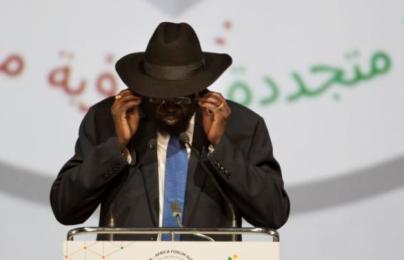South Sudan peace monitoring body rejects legitimacy of 28 states
May 4, 2016 (JUBA) – The Joint Monitoring and Evaluation Commission (JMEC) on Wednesday said it does not recognize the legitimacy of the controversial 28 states which President Salva Kiir created in violation of peace agreement and the country’s constitution.

JMEC warned that failure to suspend the 28 states by the transitional unity government would amount to non-implementation of the peace agreement.
“The JMEC doesn’t recognize the 28 states as having been described in the peace agreement and that the position of IGAD and the communique is essentially the position of JMEC and that it is a matter of no further implementation of the 28 state,” said JMEC’s Military and Security Advisor, Bill Harmon.
Also, head of the United Nations Mission in South Sudan (UNMISS) said the decision be suspended until the parties to the agreement reach a consensus to either return to the 10 states or agree to expand the number of states in a manner that would not cause ethnic frictions between local communities in the country.
“On the 28 states, as you all know, the IGAD Heads of State in a communique adopted on the 31st of January urged the transitional government immediately after its establishment to solve the issue of the 28 states, and if they couldn’t, to establish a boundary commission,” said Ellen Margrethe Løj, Special Representative and head of UNMISS.
“Now the transitional government has been established and we expect the transitional government urgently to address the issue of the 28 states,” she added.
Løj, who spoke at her first official news conference at which she officially welcomed the formation of unity government following the return to the national capital, Juba, of armed opposition leader, Riek Machar, to take up his new position as the first vice president in accordance with peace agreement, however said there are challenges.
“It is very clear that there are challenges around the country in relation to how the borders have been drawn in the 28 states proposal, and that has led to ethnic tensions in many parts of the country.”
The top UN official in the country referred to the situation around Malakal as particularly sensitive because of the ethnic composition of the population in that area on the east and west bank of the river and in the city of Malakal.
“So we expect the transitional government to urgently address the issue of 28 states, and in the meantime we are not formally recognizing the 28 states, but we are of course dealing with the officials on the ground which we have to do on a daily basis,” she pointed out.
She further said the UN system was waiting for the outcome of the transitional government’s deliberation on the states, adding this should also be done in a way that will lessen tensions in various areas.
The warning parties of former government of President Kiir and his rival, Riek Machar, in August last year signed a peace agreement on the basis of the existing 10 states.
During the peace negotiations, the armed opposition faction of the Sudan People’s Liberation Movement (SPLM-IO) led by Machar proposed 21 federal states to be based on former colonial districts in the country.
President Kiir’s government at the time rejected the proposal, arguing that the matter would be decided by the people. The government further cited lack of resources to establish more states.
However, over a month later the former government unilaterally decreed into being 28 states, a matter which has been rejected by some communities due to conflicts over boundaries.
The transitional government of national unity is expected to discuss the matter and form state governments.
(ST)
